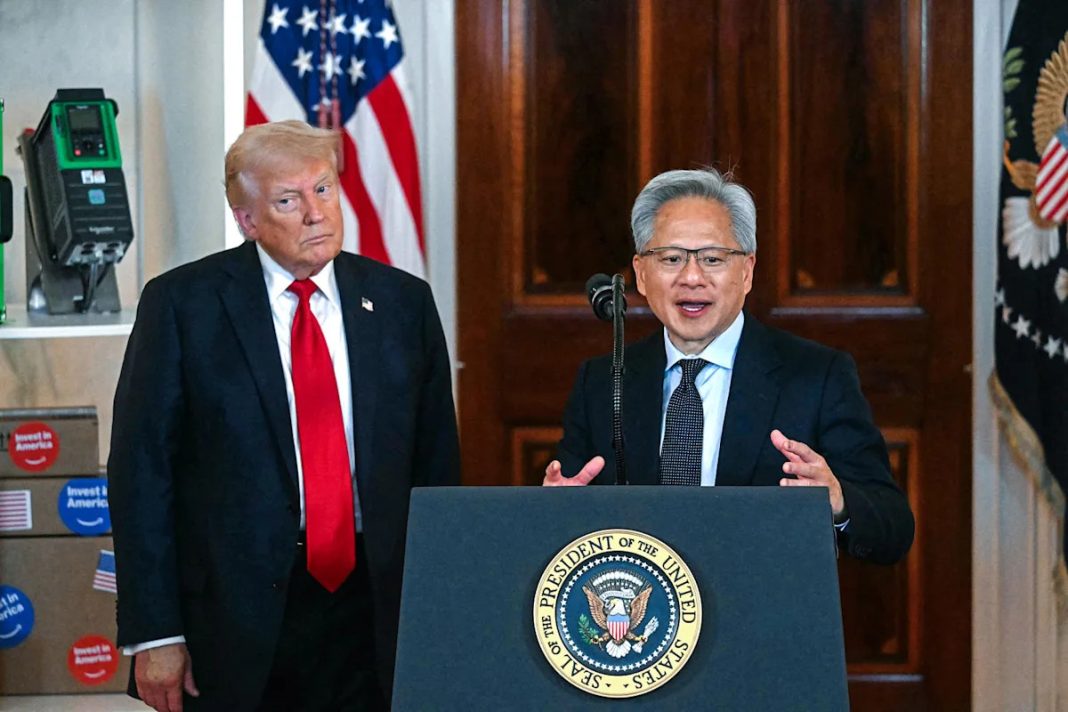To hear Jensen Huang tell it, President Donald Trump is a bold visionary leading America to triumph in business.
The CEO of major tech company Nvidia has been on a charm offensive recently, giving an interview praising Trump and downplaying concerns about tariffs to USA Today and sitting front row at a major artificial intelligence summit in Washington where the president signed executive orders aimed at boosting AI development.
“America’s unique advantage that no country could possibly have is President Trump,” Huang said. The comments were later posted by an official White House social media account keen to amplify a fresh testimonial on Trump’s leadership from a business executive now nearly as rich as Warren Buffett.
But in corporate filings with the Securities and Exchange Commission, Huang’s company struck a different tone.
A review of Nvidia’s latest quarterly filing with the SEC from April doesn’t sugarcoat the rugged business environment ahead for the $4 trillion company, the first publicly traded firm to reach that titanic market value thanks to the use of its computer chips to power all those AI programs.
Corporate leaders are just as guilty as our political ones when it comes to making bold statements they can’t quite back up. But the difference is that they are legally required to lay out an honest accounting of where things stand in SEC filings so that shareholders can make an informed decision.
In its filings, Nvidia’s immediate outlook is more volatile than Huang lets on. The filing mentions tariffs seven times and lists them under specific “risk factors” that could dent Nvidia’s revenue. The previous quarterly filing, from late 2024, only mentioned tariffs three times, and it didn’t single them out as an obstacle big enough to threaten the firm’s bottom line.
Other company filings show similarities. Ford CEO Jim Farley went on Fox News just as Trump was kicking off his global trade war in early April, saying the tariffs were an opportunity to “gain some business.” But its filings disclosed a $1.5 billion hit from the tariffs just over a month later. Harley Davidson, once a punching bag for Trump, disclosed to the government in May that the tariffs could cost it between $130 million and $175 million this year.
At one point earlier this year, Nvidia disclosed in another securities filing that it was taking a $5.5 billion hit due to new limits on H20 AI chip exports designed for the Chinese market. Those restrictions tipped Huang into action. He reportedly lobbied Trump to restart chip sales and argued the announcement strengthened Chinese competitors like Huawei. Huang got the result he wanted: The administration reversed course this month.
For a company like Nvidia looking to expand its footprint in Italy, Spain, the United Arab Emirates and beyond, Huang’s “first-buddy” diplomacy showcases the soft-touch maneuvering of chief executives desperate to avoid provoking Trump. Carlyle co-chair David Rubenstein said in April that Trump’s aggressiveness toward his critics was making business leaders afraid to speak out against his economic policies.
Instead, more of them are busy touting their “Made in America” credentials in earnings calls instead.
The business community is grappling with the reality that Trump isn’t anchored by small-government principles. He’s been zealous in broadening his personal power with little thought to institutional guardrails. In fact, Trump acknowledged he briefly toyed with breaking up Nvidia, briefly channeling a Bernie Sanders-like appetite to curb monopolies.
“I figured we could go in and we could sort of break them up a little bit, get them a little competition, and I found out it’s not easy in that business,” the president said at the AI summit this week. He did commend Huang’s meteoric success. “What a job you’ve done,” Trump said.
There is at least one red line that major business executives don’t want Trump to cross. The Chamber of Commerce on Wednesday rode to the defense of the Federal Reserve, now up against an unprecedented scorched-earth campaign from Trump over its decision to hold steady on interest rates so far this year. “The independence of the Fed has a long tradition, that has served the country well for 250 years,” the Chamber said in a little-noticed statement. “There is no reason to change it now.”
Nvidia is just one prominent example of a firm pulled in different directions. The cutting-edge Silicon Valley company is plowing ahead with its vision of dominating the AI industry. But its success is also at the mercy of a president who treats tariffs as a 19th century tool of personal pique.
For Huang, the only way to square that circle may be to say one thing to Trump in public and another thing to investors — and hope no one notices the disconnect.
This article was originally published on MSNBC.com

